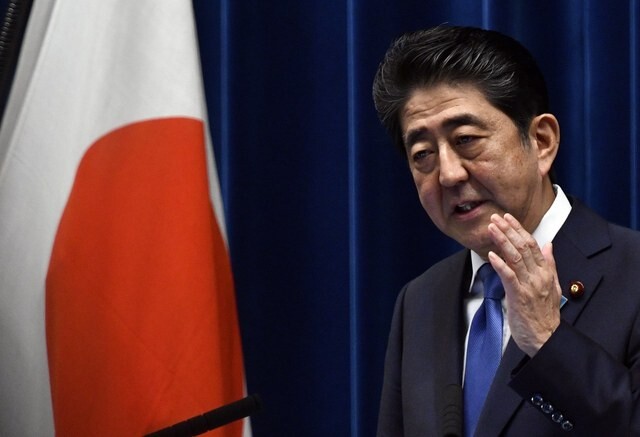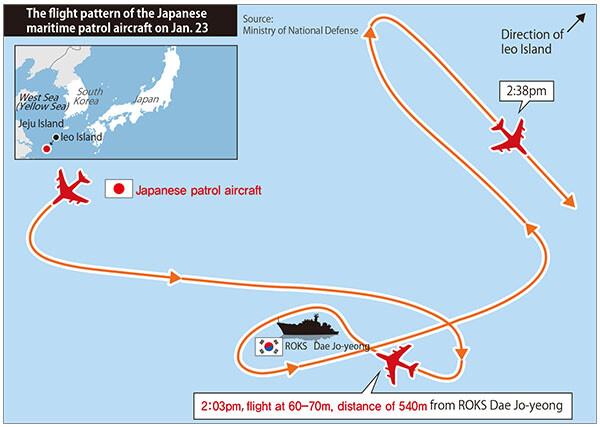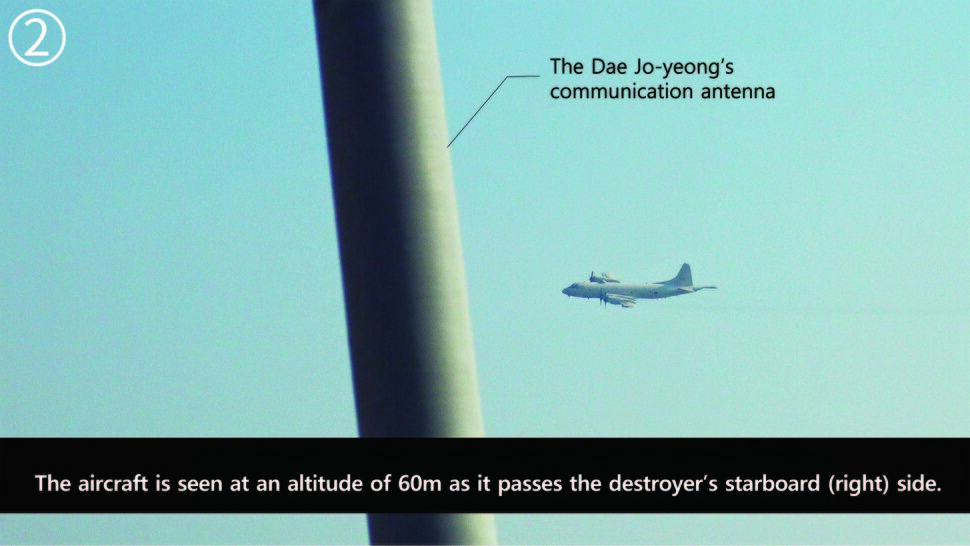hankyoreh
Links to other country sites 다른 나라 사이트 링크
[News analysis] Abe seeks to mobilize anti-Korean sentiment among Japanese for political gains

The fact that Japanese maritime patrol planes have made threatening flybys over South Korean naval vessels on no fewer than three occasions over the past week is unprecedented in South Korea-Japan relations. The two countries have been tied together by the US network of alliances in East Asia, and there’s little precedent of a military disagreement between them blowing up so publicly since they concluded their basic treaty in 1965. As the dispute expands to include targeting radars and threatening flybys, observers are wondering about what is motivating the Japanese government and the administration of Prime Minister Shinzo Abe.
One of Abe’s apparent goals is to mobilize frustration with South Korea inside Japan after a ruling about compensation for forced laborers by South Korea’s Supreme Court, while also pressuring the South Korean government into taking action. After South Korean victims of forced labor took steps to seize assets that Nippon Steel and Sumitomo Metal holds in South Korea, the Japanese government made a request on Jan. 9 for intergovernmental deliberations with South Korea, as stipulated in the dispute resolution procedures of a South Korea-Japan claims agreement, and asked the South Korean government to reply by Jan. 30.

Taking a step back, many experts believe that these actions reflect a shift in the bigger picture, a readjustment of the Abe administration’s long-term strategy. Japanese conservatives, including the Abe administration, have pushed to rearm Japan and strengthen its alliance with the US because of the rise of China and the North Korean threat. But when the US government under President Donald Trump started focusing on negotiations with North Korea and showed less interest in trilateral military cooperation with South Korea and Japan, the Abe administration took a different path as well, analysts say. Since last year, Abe has pursued reconciliation with China and Russia and has attempted to exploit conflict with South Korea. This is increasing concerns that the recent dispute between South Korea and Japan is unlikely to be resolved in the short term and could become the “new normal.”
“The right wing in Japan thought that countering China and demonizing North Korea would help them maintain the Cold War environment, but a realignment is taking place. Since South Korea and Japan have reached a turning point and are unlikely to share strategic interests moving forward, we’re seeing indications that this bilateral conflict is becoming the new normal,” said Yang Gi-ho, a professor at Sungkonghoe University.

Japan needs neighborly threats to justify increases in defense budget
This year, the Japanese government allocated 5.26 billion yen (US$47.9 million) for its defense budget, the largest amount since World War II. Since there’s considerable criticism even inside Japan about spending huge amounts of money buying big-ticket US weapon systems such as the F-35, a fifth-generation stealth fighter, and Aegis Ashore, a ballistic missile interception system, the Japanese government needs to emphasize threats from its neighbors in order to justify the constant increases in its defense budget.
There’s no obvious solution to this situation: the South Korean government has called for a “two-track” approach that would decouple historical disagreements from economic and culture issues, but Japan has not assented to this.
Yang Gi-ho argues that a defensive stance could actually encourage Japan to continue its provocations. “The government needs to be mindful of its relations with Japan and continue deliberations with Tokyo, but it should respond firmly to the issue of patrol planes making threatening flybys,” Yang said.
Another idea is that South Korea should seek a solution by creating more opportunities for cooperation with Japan in the peace process on the Korean Peninsula. “It’s not realistic to exclude Japan from the Korean Peninsula peace process. A compromise with Japan must be sought in regard to a new security order in Northeast Asia and the issue of creating a nuclear-free zone,” said Nam Gi-jeong, a professor at Seoul National University.
South Korea needs to craft a long-term strategy for creating room for cooperation with Japanese citizens who are concerned about the Abe administration’s policies and for countering efforts by pro-US alliance Japanese to throw a wrench in the works of the Korean Peninsula peace process, Nam argued
By Park Min-hee, staff reporter, and Cho Ki-weon, Tokyo correspondent
Please direct comments or questions to [english@hani.co.kr]

Editorial・opinion
![[Column] Season 2 of special prosecutor probe may be coming to Korea soon [Column] Season 2 of special prosecutor probe may be coming to Korea soon](https://flexible.img.hani.co.kr/flexible/normal/500/300/imgdb/original/2024/0426/3317141030699447.jpg) [Column] Season 2 of special prosecutor probe may be coming to Korea soon
[Column] Season 2 of special prosecutor probe may be coming to Korea soon![[Column] Park Geun-hye déjà vu in Yoon Suk-yeol [Column] Park Geun-hye déjà vu in Yoon Suk-yeol](https://flexible.img.hani.co.kr/flexible/normal/500/300/imgdb/original/2024/0424/651713945113788.jpg) [Column] Park Geun-hye déjà vu in Yoon Suk-yeol
[Column] Park Geun-hye déjà vu in Yoon Suk-yeol- [Editorial] New weight of N. Korea’s nuclear threats makes dialogue all the more urgent
- [Guest essay] The real reason Korea’s new right wants to dub Rhee a founding father
- [Column] ‘Choson’: Is it time we start referring to N. Korea in its own terms?
- [Editorial] Japan’s rewriting of history with Korea has gone too far
- [Column] The president’s questionable capacity for dialogue
- [Column] Are chaebol firms just pizza pies for families to divvy up as they please?
- [Column] Has Korea, too, crossed the Rubicon on China?
- [Correspondent’s column] In Japan’s alliance with US, echoes of its past alliances with UK
Most viewed articles
- 1‘We must say no’: Seoul defense chief on Korean, USFK involvement in hypothetical Taiwan crisis
- 2[Column] Season 2 of special prosecutor probe may be coming to Korea soon
- 3N. Korean delegation’s trip to Iran shows how Pyongyang is leveraging ties with Moscow
- 4Korea sees more deaths than births for 52nd consecutive month in February
- 5Amnesty notes ‘erosion’ of freedom of expression in Korea in annual human rights report
- 6[Reportage] On US campuses, student risk arrest as they call for divestment from Israel
- 7[Editorial] New weight of N. Korea’s nuclear threats makes dialogue all the more urgent
- 8‘Weddingflation’ breaks the bank for Korean couples-to-be
- 9[Column] Has Korea, too, crossed the Rubicon on China?
- 10[Column] Park Geun-hye déjà vu in Yoon Suk-yeol